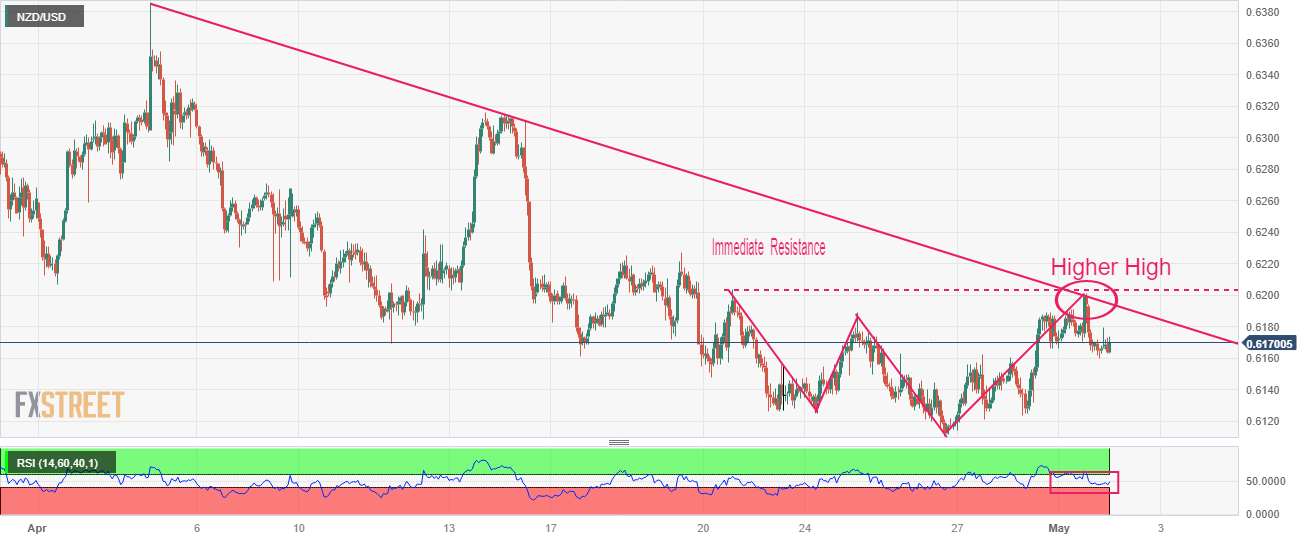- Analytics
- News and Tools
- Market News
- NZD/USD Price Analysis: Rebounds firmly above 0.6170 ahead of US/NZ Employment data
NZD/USD Price Analysis: Rebounds firmly above 0.6170 ahead of US/NZ Employment data
- NZD/USD has shown a decent recovery above 0.6170 as USD Index has sensed selling pressure.
- As per the consensus, the US economy added 150K jobs in April lower than the former additions of 145K.
- NZD/USD is continuously facing pressure near the downward-sloping trendline plotted from 0.6386.
The NZD/USD pair has scaled sharply above the immediate resistance of 0.6170 in the early Tokyo session. Earlier, the Kiwi asset witnessed an intense sell-off on Monday after failing to claim the round-level resistance of 0.6200.
The US Dollar Index (DXY) has sensed sheer selling pressure near its two-week-old resistance of 102.20. It seems that investors are digesting pre-Federal Reserve (Fed) policy anxiety.
Wednesday’s New Zealand and United States Employment data will be keenly watched. NZ’s Employment Change (Q1) is expected to remain steady at 0.2%. While the Unemployment Rate is seen rising to 3.5% from the former release of 3.4%.
On the US front, investors will keep an eye on Automatic Data Processing (ADP) Employment data. As per the consensus, the US economy added 150K jobs in April lower than the former additions of 145K.
NZD/USD is continuously facing pressure near the downward-sloping trendline plotted from April 05 high at 0.6386 on an hourly scale. The Kiwi asset has made a higher high after a lower high lower low structure, hinting for a potential bullish reversal ahead.
The New Zealand Dollar is facing immediate selling pressure near horizontal resistance placed from April 20 high at 0.6204.
Meanwhile, the Relative Strength Index (RSI) (14) has slipped back into the 40.00-60.00 range, indicating consolidation ahead.
Should the asset break above April 20 high at 0.6204, kiwi bulls will drive the asset towards April 19 high at 0.6227 followed by April 07 high at 0.6265.
In an alternate scenario, a breakdown of April 26 low at 0.6110 will drag the asset toward March 08 low at 0.6088 followed by the 15 Nov 2022 low at 0.6058.
NZD/USD hourly chart

© 2000-2026. All rights reserved.
This site is managed by Teletrade D.J. LLC 2351 LLC 2022 (Euro House, Richmond Hill Road, Kingstown, VC0100, St. Vincent and the Grenadines).
The information on this website is for informational purposes only and does not constitute any investment advice.
The company does not serve or provide services to customers who are residents of the US, Canada, Iran, The Democratic People's Republic of Korea, Yemen and FATF blacklisted countries.
Making transactions on financial markets with marginal financial instruments opens up wide possibilities and allows investors who are willing to take risks to earn high profits, carrying a potentially high risk of losses at the same time. Therefore you should responsibly approach the issue of choosing the appropriate investment strategy, taking the available resources into account, before starting trading.
Use of the information: full or partial use of materials from this website must always be referenced to TeleTrade as the source of information. Use of the materials on the Internet must be accompanied by a hyperlink to teletrade.org. Automatic import of materials and information from this website is prohibited.
Please contact our PR department if you have any questions or need assistance at pr@teletrade.global.















